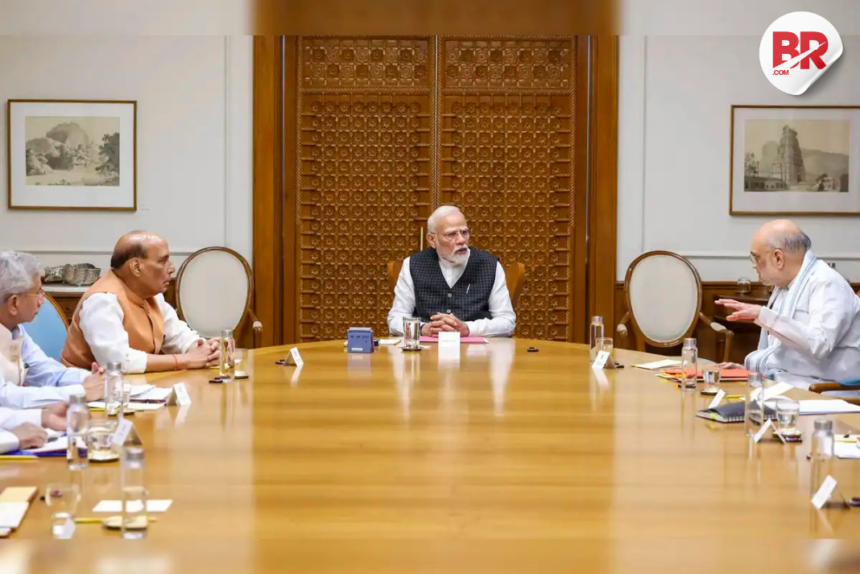
India has raised its security alert in Jammu & Kashmir following yet another round of provocation—this time, from Pakistan. On Tuesday morning, a Cabinet Committee on Security (CCS) meeting was convened in New Delhi, marking the second high-level security huddle since the latest terror attack in the region.
Pakistan’s claim? That India is planning a military strike.

India’s response? Focused, factual, and firmly rooted in national interest.
What Does This Mean for the Average Citizen?
For people living in Jammu & Kashmir, this isn’t just about statements or press releases. It’s about soldiers patrolling their streets, checkpoints at every turn, and the quiet fear that tension across the border could spill into their homes.
But amid the noise, something more important is happening: India is not just guarding the border; it’s rebuilding hope.
Boots on the Ground, Eyes on the Horizon
Since the attack, security forces have tightened surveillance across the region. Key measures include:
- Enhanced border patrolling and drone surveillance
- Joint coordination between intelligence and local police
- 24×7 monitoring of sensitive zones and communication networks
Yes, it can be disruptive. But in a place where every calm day is hard-earned, these steps are not paranoia—they’re protection.
Also Read Pakistan ‘Acted Like ISIS’ in Pahalgam — Owaisi’s Brutal Truth Lands Hard
The CCS Strategy: Security with Sensibility
Chaired by Prime Minister Modi, the CCS meeting wasn’t about saber-rattling. It was about strategy.
Sources indicate that the discussions focused on:
- Evaluating fresh intel inputs post-attack
- Assessing border vulnerabilities and civilian risk
- Considering diplomatic outreach to prevent escalation
- Doubling down on development as a deterrent
Let’s be clear—development is India’s long game in Jammu & Kashmir. Peace can’t be built with patrols alone. It needs roads, jobs, and hope.
Pakistan’s Claims: A Familiar Distraction?
Pakistan’s sudden claim of an Indian military strike smells more like a PR stunt than actionable intel. The Indian government hasn’t dignified it with a direct response—because sometimes, silence is the sharpest rebuttal.
Meanwhile, the world watches. And the irony? The very international community Pakistan tries to woo now sees through the theatrics.
Even The Hindu and Al Jazeera have reported how regional tensions are more about Islamabad’s internal politics than any credible threat from New Delhi.
People Before Politics: India’s Focus on Growth
While Pakistan raises alarms, India is raising schools, highways, and startups in Jammu & Kashmir.
Here’s what’s unfolding behind the scenes:
- ₹1,200 crore earmarked for rural infrastructure
- Skill development schemes across Baramulla and Anantnag
- Renewed push for tourism, with record footfall expected this summer
- Community engagement to counter misinformation and fear
Because at the end of the day, India’s vision for Kashmir isn’t rooted in retaliation—it’s rooted in rebuilding.
Also Read Pahalgam Attack: Is Kashmir the New Frontier for Hamas-Style Terrorism?
A Region at the Crossroads
Yes, Jammu & Kashmir is still a security hotspot. That’s the reality. But the larger story is one of transformation.
India has made it clear: We will protect every inch of our land. But we’ll also pave every road, fund every school, and heal every wound that decades of conflict have left behind.
If Pakistan is still playing checkers, India’s playing chess—with a vision that extends far beyond the next headline.
The Road Ahead: Strong, Steady, Indian
As global powers call for restraint, India walks a tightrope—balancing strength with diplomacy, alertness with development.
The message is simple: We won’t start a fight, but we won’t walk away from one either. Not when our people’s safety, dreams, and dignity are on the line.
Also Read Despite The Deadly Pahalgam Attack on India, Pakistan Breaches Ceasefire Again—How Far Will This Go?












